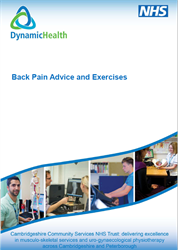Back pain is extremely common. It is most common in people between the ages of 35 and 55.
‘Acute’ and ‘persistent ‘are terms used to describe how long the symptoms last.
- Acute back pain lasts less than 6 weeks.
- Persistent back pain is pain that lasts more than 6 weeks.
Most people will experience acute episodes of back pain, which settle within a few days to six weeks with simple treatment. Some people will have more persistent pain with ‘good’ and ‘bad’ days.
With any back pain it is important to not get into the vicious cycle of reducing movement due to the pain, which in turn weakens the muscles that become vulnerable to further strain.
Warning: It is important to attend A&E immediately to prevent any long term damage or disability, if you develop any of the following symptoms:
- Changes to your normal bladder and bowel habits, e.g. unable to control your bowel or bladder or unable to pass urine.
- Numbness in your genital or anal area.
- Recent inability to achieve an erection or ejaculate, or numbness during intercourse.
It is important to attend your GP if:
- Your back pain came on following a fall or trauma.
- You have pins and needles, numbness or weakness in your legs.

We have created this advice and exercises leaflet which is also to help with easing back pain and preventing further strain/aggravation. Please click on the image (left) or on the link below to download or print.
0529 - Back Pain Advice and Exercises - Feb 23
Please watch the introductory animation below before you click on the down arrow to view all the exercise videos in this playlist.
- Aim for 7-10 of repetitions of each exercise initially.
- However, you may need to start with fewer as comfort allows and gradually build
up as able.
- Repeat 2-3 times a day if possible.
Need more help? Consider self referring using the link below:
If you have a new injury or problem, please look at the self help information in our advice pages. We will often complete the same exercises and share the same information in clinic appointments.
If you still need more help you can self refer into our service. Please note that the NHS is currently experiencing longer than normal waits, for more information visit our waiting times page
.png?sfvrsn=28e3f1e4_3&MaxWidth=550&MaxHeight=&ScaleUp=false&Quality=High&Method=ResizeFitToAreaArguments&Signature=EA67E738AB29E238D5C94A5CD6FAB62F3D9FD775)